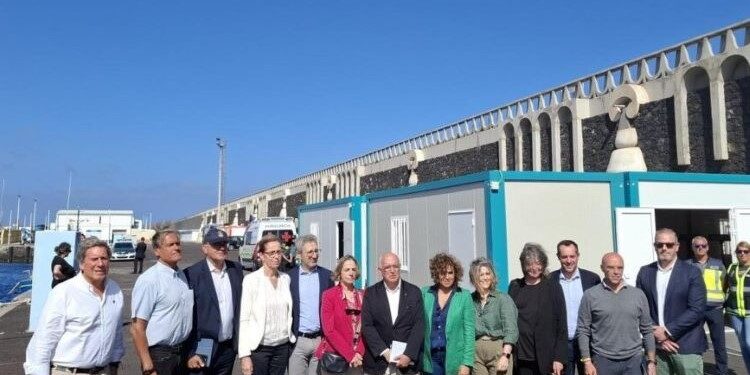Ane Barcos
A delegation from the European Parliament’s Committee on Civil Liberties visited the island of El Hierro this week to assess the situation regarding irregular migrant arrivals, paying particular attention to the situation of unaccompanied minors.
Over the course of two days, nine MEPs met with local, regional, and national authorities, including the President of the Autonomous Region of the Canary Islands, Fernando Clavijo Batlle; Vice President Manuel Domínguez González; and the President of the El Hierro Island Council, Alpidio Armas González. They also held meetings with officials from Frontex, the European Asylum Agency, as well as representatives of the Regional High Court and the Regional Prosecutor’s Office.
The group was composed of Spanish MEPs Dolors Montserrat of the European People’s Party (EPP), Juan Fernando López Aguilar and Cecilia Strada of the Progressive Alliance of Socialists and Democrats (S&D) Group, Jorge Buxadé Villalba of Patriots for Europe (PfE), as well as Gabriel Mato of the EPP and Diego Solier of the European Conservative and Reformist Group (ECR).
They were also accompanied by Frenchman Nicolas Bay of the ECR and Fabienne Keller of the Renew group. During the visit, they toured a disembarkation center in La Restinga, a police identification facility in San Andrés, and a reception center for unaccompanied minors in Valverde.
This visit is part of the upcoming implementation of the European Pact on Asylum and Migration, adopted in May 2024, whose Common Implementation Plan was approved by the European Commission in June 2024 to support Member States. Its full implementation is expected by mid-2026.
MEPs received detailed information on current practices and the main challenges in identifying and receiving migrants arriving via the West African route. They also analyzed maritime search and rescue operations, along with subsequent procedures carried out by authorities, including police forces, the prosecutor’s office, and the judiciary. Particular attention was paid to the situation of unaccompanied minors housed on the island.
At the conclusion of the visit, Javier Zarzalejos, Chair of the Committee on Civil Liberties and head of the delegation, thanked the local, island, and regional authorities for their efforts and highlighted the empathy shown by the local population. He also praised the work of the National Police, the Civil Guard, and the NGOs operating in the territory. Zarzalejos acknowledged the difficulty for a small island with limited resources in dealing with sudden waves of migrants, and stressed the importance of effective coordination among all actors involved, as well as the need for adequate personnel, equipment, and funding.
While highlighting the advances in infrastructure that have improved the reception process, he insisted that further procedures still need to be strengthened, especially in the areas of asylum and returns. “Although irregular arrivals have decreased compared to the previous year, the situation remains tensely calm, and reception centers for unaccompanied minors continue to operate beyond their capacity,” he stated. He also highlighted the work of Frontex and the European Asylum Agency, thanking them for their commitment.
The Committee President emphasized that the implementation of the new European Pact on Asylum and Migration is a priority for most members of the Commission. This task will require greater cooperation and coordination among all parties involved, as well as the adoption of the necessary measures to manage the processes within the established timeframes, ensuring full respect for fundamental rights.
The delegation emphasized the importance of strengthening collaboration with third countries of transit and origin. The delegation reaffirmed the importance of European Union support to enable El Hierro and the Canary Islands to address these challenges effectively and sustainably.







